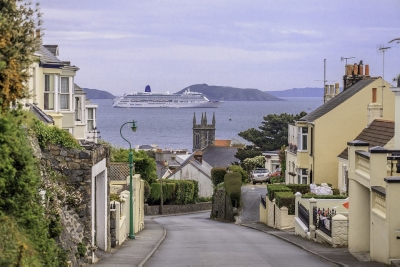
Chris Dye (Guernsey, Channel Islands)
Having been working in Guernsey as a corporate attorney for the past two years, I have noticed that the history of Quebec and the Channel Islands have interesting parallels. Both have inherited their political, legal and linguistic culture from northern France and have retained significant autonomy, but have undergone centuries of British influence that has transformed their institutions, culture and law.
Guernsey came under British protection in what might be called today a reverse takeover. The Duchy of Normandy acquired Guernsey more than a century before William of Normandy conquered England in 1066. William’s successors were not so militarily adept and by 1204 the Anglo-Norman kings had lost all of mainland France, leaving Guernsey and its neighbouring islands in the English Channel as the last remnants of the Duchy of Normandy. Those islands remained politically distinct from England and were given wide autonomy by the English Crown.
The Bailiwicks of Guernsey and Jersey kept their own legal systems, based on Norman customary law. Norman custom was largely based on Roman law (much as was the Custom of Paris that was adopted in New France). English common law was never exported to Guernsey, although legislation and judicial interpretation of Guernsey custom adopted many English concepts. For instance, courts of equity never existed in Guernsey, so many equitable remedies are not recognised, although courts eventually found that they had the power to issue injunctions and recognise trusts.
Norman customary remedies continue to exist in Guernsey. These include the “Clameur de Haro”, where an unjust act may be halted by falling to one’s knees, raising one’s arms and loudly reciting “Haro! Haro! Haro! A l’aide, mon Prince, on me fait tort!” followed by the Lord’s Prayer; upon which the alleged wrongdoer must cease his activity until the dispute is heard before a judge. The Clameur de Haro was last used in Guernsey in 2016 to stop planning officials from towing a man’s rusty, broken down Kia Sportage off his lawn.
Guernsey remained linguistically and culturally distinct from England for centuries. The language of the courts and government was Parisian French. The local population spoke Norman French, known locally as Guernésiais (which is perhaps the closest dialect to Québécois French that still exists). France, being much closer than England, was Guernsey’s largest trading partner.
This changed in the nineteenth century, as smuggling and Napoleon’s invasion threat prompted England to boost its military presence in Guernsey. This was followed by the arrival of English merchants and tourists, who found the prosperous, sunny Channel Islands irresistible. With the rise in offshore finance in the late twentieth century, the Channel Islands – with stable governments, low corporate taxation, integration with the UK banking system and short flights to London – became ideal jurisdictions for UK investors to set up investment funds, trusts and companies. Offshore finance brought to Guernsey a large influx of lawyers and financial services professionals from England.
English integration pressures had a huge impact on the local culture, political institutions and law of Guernsey. The language of commerce switched from French to English in the 19th century. The prestige of the Guernésiais language, dismissively called “Patois” by the unilingual English-speaking population, plummeted to the point of not being transmitted to children. By the 1930s, it became impractical to conduct official business in French, since so few people could speak it. Now, well under 1% of the population can speak Guernésiais.
Guernsey advocates, in addition to getting qualified as a barrister or solicitor in the United Kingdom, must take courses in the local law and a three-month course in Norman law at the University of Caen. However, Norman custom has become irrelevant in most aspects of Guernsey law other than real property rights. Almost all new Guernsey legislation (which must be vetted and approved by the British Crown) is highly influenced by U.K. models. Guernsey customary remedies are expressly waived in Guernsey contracts as a matter of course, to the point where it is debatable to what extent they still exist. A large number of Guernsey practitioners who spent significant time working in London have little patience with Guernsey legal concepts, many of which have never been written down or are set out in century-old French-language ordinances that have neither been digitized nor translated.
As the only member of the Quebec Bar practicing in Guernsey, I find it a shame that so few Quebec lawyers and academics are aware of the existence of Guernsey as a distant cousin. Both Quebec and Guernsey would benefit from studying each other. I have taken it upon myself to learn as much Guernésiais as I can and transmit it to my children, so that this beautiful, neglected language can continue into the future.
